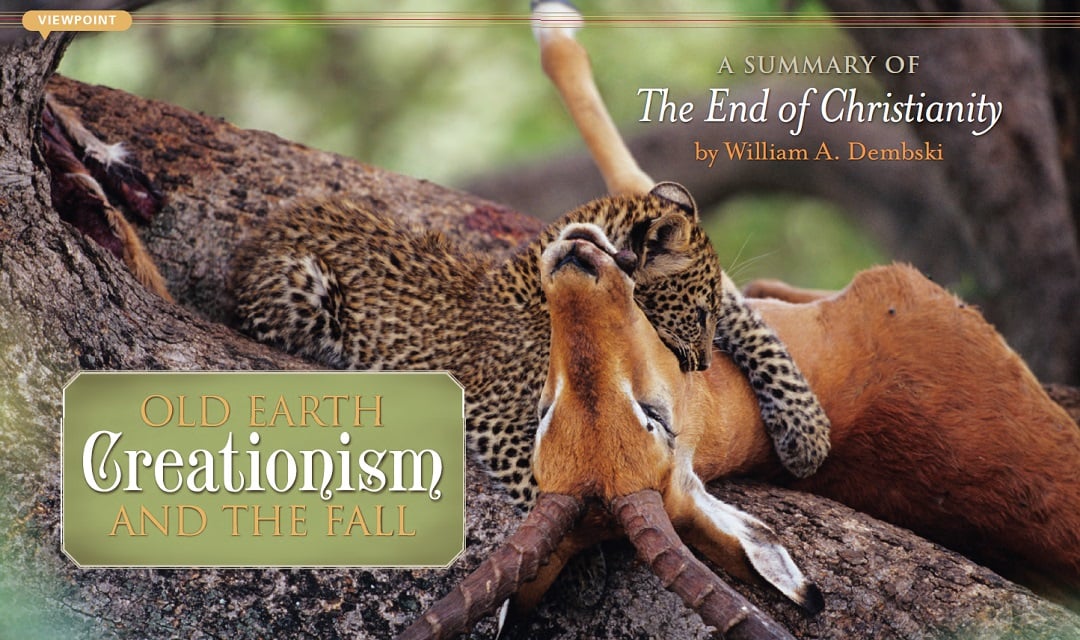This article first appeared in Christian Research Journal, volume 34, number 04 (2011). The full text of this article in PDF format can be obtained by clicking here. For further information about the Christian Research Journal, click here.
SYNOPSIS
The End of Christianity presupposes that the earth and universe are old and, given that presupposition, attempts to answer how the fall of humanity could be responsible for natural evil, such as animal suffering. As such, it is a work of speculative theology. Since, on the presupposition of an old earth, animal suffering precedes the arrival of humans, the challenge is to explain how the effect (natural evil) can temporally precede the cause (human sin and the fall). My solution in my book The End of Christianity is to argue that, just as the effects of salvation at the cross of Christ reach both forward in time (saving present-day Christians) and backward (saving Old Testament saints), so the effects of the fall reach forward in time as well as backward. What makes this argument work is the ability of God to arrange events at one time to anticipate events at a later time. From the vantage of a young earth, The End of Christianity may seem like a vain exercise (given a young earth, natural evil comes directly after the fall and is a clear consequence of it). Yet, the evidence of science suggests that the earth and universe are much older than the chronologies in Genesis 1–11 would indicate. It is classical Christian orthodoxy that the fall of humanity is responsible for both moral evil (the evil that humans commit against each other) and natural evil (the evil that nature commits against creatures capable of experiencing pain). The End of Christianity attempts to create conceptual space for the old-earth position consistent with Christian orthodoxy, which has always taught that the fall is responsible for both moral and natural evil.
If I were to write The End of Christianity today, the first thing I would do is retitle it. The full title of the book is The End of Christianity: Finding a Good God in an Evil World. With that title I was trying to cash in on the spate of books by neoatheists arguing that atheism is preferable to Christian theism. At the same time, with the subtitle, I was trying to maintain some truth in advertising by indicating the real subject of the book. Playing off an ambiguity in the word “end” (end as demise or collapse versus end as goal or purpose), I hoped to get atheist readers to pick up the book, thinking that this book was about the collapse of Christianity, only to find that it was arguing for Christianity’s full truth and relevance to humanity’s main predicament, namely, dealing with the problem of evil.
In any case, the atheists were not fooled by the title, and the Christian community was left scratching its head. A better title would have been “Christian Theodicy in Light of Genesis and Modern Science,” which was the title of a typescript that I circulated among colleagues that eventually turned into The End of Christianity. Perhaps the most descriptive title, however, is the one of this article: “Old Earth Creationism and the Fall.” Christians are, by definition, creationists—we believe that God by wisdom created the world. Within this broad conception of creationism, however, several deep conceptual divides exist. On the one hand are the traditional creationists who believe that God specially intervened at key points in the history of the cosmos to actualize His purposes (such as by directly creating human beings). On the other hand are the evolutionary creationists who believe that God used an evolutionary process to bring about life and the cosmos.
I am firmly on the side of the traditional creationists, seeing nothing substandard or suspect in the idea of God intervening in the world. Intervention has become a term of abuse in much of contemporary theology, but it is a good term. We certainly like it when doctors intervene to save our lives, and it seems that much of the history of Christian doctrine has embraced God acting in both salvation and natural history in ways that are not reducible to purely natural or material forces, that is, in miraculous ways for which the term “divine intervention” is entirely appropriate. Only with the rise of evolutionary naturalism has the idea that God can and does intervene in the world become widely suspect.
To put out my cards, I am a biblical inerrantist, accepting the full verbal inspiration of the Bible and the conventional authorship of the books of the Bible. Thus, in particular, I accept Mosaic authorship of Genesis (and of the entire Pentateuch) and reject the documentary hypothesis. Moreover, even though I introduce in The End of Christianity a distinction between kairos (God’s time) and chronos (the world’s time), the two are not mutually exclusive. In particular, I accept that the events described in Genesis 1–3 happened in ordinary space-time, and thus that these chapters are as historical as the rest of the Pentateuch. Finally, I believe that Adam and Eve were real people, that as the initial pair of humans they were the progenitors of the whole human race, that they were specially created by God, and thus that they were not the result of an evolutionary process from primate or hominid ancestors.
Now, for much of mainstream contemporary theology, these views place me at the far right extreme. Princeton Theological Seminary, where I got my seminary training, would regard these views as fundamentalist. So would so-called moderate Baptists, such as at Baylor University, where I spent five years on faculty. I’m not interested in what labels get attached to me, however. Much more important to me is whether the views just expressed are true and defensible. I believe that they are, and in The End of Christianity I defend their truth.
Even with my conservative theological views on the Christian doctrine of creation, nonetheless, many Christians reject my views as not conservative enough! I teach at a Southern Baptist theological seminary (Southwestern Seminary in Fort Worth, Texas). I signed the Baptist Faith and Message 2000 in good faith along with the Chicago Statement on Biblical Inerrancy and the Danvers Statement on Biblical Manhood and Womanhood. Nowhere in any of these documents are its subscribers asked to adhere to a recent, or young-earth, view of creation (i.e., a creation that took place in six, twenty-four-hour days roughly six thousand years ago). And yet, young-earth creationists have found the view of creation that I defend in The End of Christianity problematic.
That’s because even within a traditional creationism that’s comfortable with divine intervention (in contrast to an evolutionary creationism), a significant divide exists between those who see Genesis 1–3 as teaching a recent creation and those who, like me, see it as allowing a much longer history of the earth and cosmos consistent with the sciences of contemporary geology and astrophysics. Indeed, my main motivation for writing The End of Christianity was to address this divide. On the one hand is the weight of a long-held interpretation of Genesis that sees it as teaching a recent creation. On the other hand is the weight of contemporary science, which seems strongly to confirm an old earth and universe.
I feel this tension. As I make clear in The End of Christianity, I would be a young-earth creationist in a heartbeat purely on exegetical and historical grounds. And yet the evidence of modern science seems greatly at odds with young-earth creationism. It seems then that we have a forced choice between science and Scripture. Do we elevate Scripture above science or science above Scripture? What I tried to do in The End of Christianity was point a way beyond this forced choice by offering theological and exegetical grounds for an old-earth view that are consistent with the sciences of geology and astrophysics.
At the heart of the young-earth vs. old-earth debate are two main concerns, one exegetical, the other theological. Exegetically, the most natural reading of Genesis 1–3 suggests a young earth. As I point out in The End of Christianity, the church fathers, the scholastics, and the reformers were all young-earth creationists, basing their position on a straightforward reading of Genesis. That said, I also argue that the history of interpretation of Scripture shows how long-held biblical interpretations have been revised in light of modern science. For instance, Christian thinkers have universally relinquished geocentrism, despite many passages that seem to teach it in Scripture, in light of the Copernican Revolution. Such episodes indicate to me that theological concerns cannot be divorced from exegetical concerns. Exegetically, a geocentrist view makes better biblical sense. And yet the Bible must be read in the context of a total worldview, which invariably incorporates our current understanding of science.
This point may seem controversial, but it should not be. Yes, the Bible is God’s unerring and inspired Word, encapsulating humanity’s chief truth, namely, that God was in Christ reconciling the world to Himself. The Bible’s teaching must therefore be taken with utmost seriousness and its teaching takes precedence over all other teachings. Nonetheless, our very understanding of the Bible—that is, what it teaches—depends on our general knowledge of the world. Could we know what it means for Jesus to be the Lamb of God if we didn’t know anything about animal husbandry and sheep in particular? So, while the Bible occupies a privileged place for any Christian, its understanding depends at least in part on our general understanding of the world, which includes our scientific understanding of the world.
And that brings us to our other main concern, namely, that the debate between young-earth and old-earth creationism is not simply exegetical, but also theological. On strict exegetical grounds, a young earth is to be preferred over an old earth. But, as we saw with geocentrism, exegesis is not enough in interpreting the Bible—geocentrism is also to be preferred on purely exegetical grounds. Accordingly, biblical interpretation occurs within a theologically informed worldview. And it’s precisely here that we observe a disconnect between a young-earth view and geocentrism: a lot more is riding theologically on a young earth than on geocentrism. The switch from geocentrism to heliocentrism merely changes our space-time coordinates in the universe. The switch from young-earth to old-earth creationism, by contrast, seems to undercut the orthodox view of sin and redemption.
To see this, consider a video produced by the Institute for Creation Research (ICR) a few years back. Titled “Thousands, Not Billions,” the video arose out of an ICR project for dating the earth and universe based on accepted scientific methods. The interesting thing is how this video starts. It didn’t start with a scientific exposition of why the mainstream scientific position on dating the earth and universe is wrong. It started, rather, by showing a college-bound student being warned by his pastor about the dangers of being swayed at college to believe in an old earth because doing so would undercut the clear biblical teaching that death came into the world by sin (citing Romans 5).
On a young-earth view, this problem doesn’t arise because the world prior to Adam’s fall is perfect. Only after the fall does the world go haywire, with natural and moral evil the result. Old-earth creationism has tended to sidestep this problem, arguing that natural evil prior to the fall is not really a problem because it isn’t morally significant. Accordingly, animal death and suffering are seen as morally neutral. I detail this view held by old-earth creationists in The End of Christianity. This dismissal by old-earth creationism of natural evil prior to the fall, however, seems too easy. It’s not just that animals are painlessly passing into oblivion prior to the fall, but that they are dying excruciating deaths by disease, predation, and parasitism, among other things. Indeed, the ways animals have died and suffered in natural history exhibits a deep-seated malevolence.
Interestingly, young-earth creationism has orthodox theology on its side in insisting that all evil in the world, both natural and moral, is the result of the fall. The view that all evil in the world ultimately traces back to the sin of humanity at the fall used to be an essential piece of the Christian worldview. As the Catholic Encyclopedia notes: “Christian philosophy has, like the Hebrew, uniformly attributed moral and physical evil to the action of created free will. Man has himself brought about the evil from which he suffers by transgressing the law of God, on obedience to which his happiness depended.…The errors of mankind, mistaking the true conditions of its own well-being, have been the cause of moral and physical evil.”1 What the Catholic Encyclopedia here calls “physical evil” is, of course, what we have been calling “natural evil.”
Given such strong theological reasons for accepting that natural evil is a consequence of the fall, what then to do with the evidence of contemporary science, which to many clearly suggests that the earth and universe are billions rather than thousands of years old? Given a young earth, natural evil need not be present in the world until after humanity’s fall. But given an old earth, natural evil must be widely prevalent before humans arrive on the scene. How then can the fall, which is due to the sin of humanity, be responsible for natural evil that predates humanity? That’s the million-dollar question that I seek to answer in The End of Christianity.
My solution is to argue that just as the effects of Christ’s salvation, purchased for humanity at the cross and through His resurrection, though occurring two thousand years ago span all of history, saving not only present-day followers of Christ, but also Old Testament saints; so too the effects of the fall span all of history, leading not only to the moral and natural evil that we now see, but also accounting for the natural evil that predates humanity (moral evil not being in the world until after the arrival of humans). How can this be? How can the effect (natural evil) precede the cause (the fall)? The analogy with the salvation in Christ spanning history is helpful here, but explicating this case of “backward causation,” where the fall accounts for natural evil that occurs prior to it, looks not to an analogy but to a biblically based doctrine of divine anticipation.
God, by knowing the future, can anticipate future events and arrange circumstances so that these events play out in precise ways that accomplish God’s good purposes. Throughout Scripture God is portrayed as unbound by time.2 For instance, in Isaiah 46:9–10, one reads, “I am God, and there is none like me, declaring the end from the beginning, and from ancient times the things that are not yet done, saying, my counsel shall stand, and I will do all my pleasure.” Scripture even explicitly states that God acts in anticipation of future events. Thus, in Isaiah 65:24, God says, “It shall come to pass that before they call, I will answer; and while they are yet speaking, I will hear.”
This idea of the fall’s effects being retroactive, going both backward and forward in time, may sound like science fiction, but makes perfect sense considering the Christian God, who created the very nature described by science. Nonetheless, if one takes to heart that the evidence of science strongly supports an old earth and at the same time wants to hold to a traditional conception of the fall that makes natural evil a consequence of it, something like the fall having retroactive effects seems unavoidable.
Indeed, when Christian geologists started seriously wrestling with how to make sense of the fall in light of an earth that seemed far older than Scripture had previously seemed to suggest, they came up precisely with this solution. Thus J. Jay Dana, writing in 1853, before the Darwinian revolution but after the revolution in geology (which assigned a much older age to Earth than customarily associated with Genesis), affirmed the fall as the cause of animal death, but separated it from the temporal appearance of death: “If sin could be pardoned in view of a foreseen offering which should atone for its guilt, then a foreseen offence may be made a reason for accommodating the physical conformation of things to such an event.”3
This view of the fall having retroactive effects, however, never gained much traction in the nineteenth century. Indeed, it quickly disappeared from most theological discussions of the fall. Moreover, it was never developed in any depth, which is something I do in The End of Christianity. Indeed, the bulk of that book tries to make this retroactive view of the fall plausible theologically. I find, for instance, that my retroactive view, which entails the presence of natural evil in the world before the arrival of humans, makes sense of why humans are placed at their creation in a segregated area—a “garden.” Why put Adam and Eve in a garden that’s separate from the rest of the earth if the rest of the earth is unaffected by natural evil? In that case, wouldn’t the whole earth be a garden, a paradise? It seems that the retroactive view of the fall does account for some things that remain anomalous on a young-earth view.
One reviewer, reading my account of retroactivity and divine anticipation, likened God’s introduction of natural evil in anticipation of the fall to a father spanking his son every morning with the rationalization that at some point during the day the boy is going to do something wrong, so the father may as well get the punishment out of the way from the start. But this reading seems uncharitable. Humans, in my account of the fall, never experience the effects of natural evil until they have actually committed evil. This reviewer’s analogy would have been better if he had said the father got a paddle ready with which to spank the child knowing that the child would misbehave and require a spanking. But getting a paddle ready involves no injustice—if the bad behavior never occurs, it need never be used.
But what about inflicting natural evil on the world? Is God unjust to allow animals to suffer natural evil in response to the fall? If this is a problem, it is as much one for young-earth creationism as the retroactive form of old-earth creationism that I am advocating. When humans, as the crown and covenant head of creation, fall, the rest of creation suffers. In the divine economy, this is how the world works. On an old-earth view, this means that creation experiences natural evil from the fall before the fall actually happens. There’s a mystery here. Why do children suffer the consequences of their parents’ sin (think of crack babies)? There are no easy answers. The best we can say, as Christians, is that God allows evil because He brings good out of it, thus making good rather than evil the final word.
In closing this summary of The End of Christianity, I don’t want to leave the impression that I’m using science to trump the Bible. I know intimately the “science-religion dialogue,” as it is called, and few things have repulsed me more than idolatrous worship of science at the expense of Scriptural truth. That said, God is the God of the whole world. He has revealed Himself in Scripture, yes, but He has also revealed Himself in creation/nature (cf. Rom. 1:20). Both revelations are true. Unfortunately, in a fallen world, the truth of God’s revelation, whatever form it takes, is not self-evident (cf. 2 Tim. 2:15). Often it takes hard work to figure out what a revelation really means. Dealing with revelation is a task of interpretation, and interpretation is always an intense intellectual act that depends on our worldview and background knowledge. I don’t believe in using science to trump Scripture. At the same time, I don’t believe in using a possibly mistaken interpretation of Scripture to trump science. Either option is too easy and doesn’t get at the truth. The problem is that we live in an age of short attention spans where people want easy answers. May God give us the grace to read the Book of Scripture and the Book of Nature aright.
William A. Dembski, Ph.D., is the author or editor of more than twenty books, including The Design of Life: Discovering Signs of Intelligence in Biological Systems (Foundation for Thought and Ethics, 2008).
NOTES
- Catholic Encyclopedia, s.v. “Evil,” available online at http://www.newadvent.org/cathen/05649a.htm (accessed March 15, 2007).
- In saying that God is unbound by time, I’m not committing myself to an A-theory or B-theory of time, in which God is essentially a tensed or tenseless being. I’m simply saying that time poses no obstacle to divine action, so that God is never in a position to say, “Gee, I wish I had done this differently in the past because now something unexpected happened that I didn’t anticipate.” God is able to anticipate all events and act in ways that coordinate them to accomplish His purposes.
- Jay Dana, “The Religion of Geology,” Bibliotheca Sacra 10 (1853): 521.









